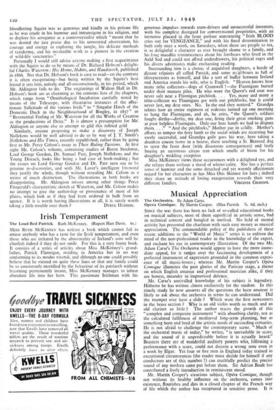Eccentrics
Their Ruling Passions By Percy Colson. Foreword by James Laver. (Hutchinson. 18s.)
MR. RICI-LARD ALDINGTON gives a good definition of eccentricity as " the comedy-farce of individualism unconsciously carried to absurdity, but not to insanity." The Oxford Dictionary, more guarded, describes the eccentric as " a person whose conduct is irregular, odd, or whimsical." Undoubtedly the label is often wrongly used to imply that its bearer is more or less out of his mind. For this reason there arc many people—Squire Waterton was among them—who might be willing to concede that their conduct is whim- sical, or even odd, but who would strongly object to being called eccentric. And therefore responsible writers handle the word gingerly. They often prefer to call their subjects "characters," realising that they would probably be played on the stage or screen, as Mr. Laver points out, by " character actors " or " feature players " rather than by the juvenile lead. If the life of Charles Waterton is ever made into a film, however, it will require a combination of Douglas Fairbanks and Harpo Marx to suggest the man who stood on one leg on the head of the angel above the Castello di Sant' Angelo in Rome, who rode on the back of a South American cayman, who barked at his guests from beneath the hall table, who treated a sprained ankle by holding it under Niagara Falls, and who could scratch the back of his head with his big toe at the age of seventy- seven.
Both these books are concerned, then, with eccentrics or, if you like, " characters." Waterton has not been particularly fortunate in his recent biographers. Miss Edith Sitwell included an essay on him in her book The English Eccentrics, but the presentation was not well considered and there were, as Mr. Aldington points out, a number of errors of fact. Mr Philip Gosse's biography of Water- ton The Squire of Walton Rail (1940) is one of those books in which nearly every sentence begins OD a fresh line ; it contains a mass of material only partly digested but has some interesting photographs. No fresh unpublished material appears to have been available to Mr. Richard Aldington, who has based his new book primarily on Waterton's Autobiography, his Wanderings in South America, the three series of his essays and Dr. HObson's biography. Mr. Alding- ton's style as a biographer is patchy ; he is not ashamed to begin a chapter with the sentence, "Among the grievances of Roman Catholics in the days before Emancipation was education," or to write of a policeman who rescued a dog as " this tail-wagger's friend." But he has made a thorough study of his very entertaining subject and gives us perhaps the most balanced account of Waterton that has so far appeared. He does well to show that the teetotal
bloodletting Squire was as generous and kindly in his private life as he was crude in his humour and intransigent in his religion, and to deplore his arrogance as a controversialist which " meant that he was denied the just praise due to his unwearied observation, his courage and energy in exploring the jungle, his delicate methods of taxidermy, and his invaluable work as a pioneer in the creation of wild-life sanctuaries."
Personally I would still advise anyone making a first acquaintance with the Squire to do so by means of Dr. Richard Hobson's delight- ful Charles Waterton : His Home, Habits, and Handiwork, published in 1866. Not that Dr. Hobson's book is easy to read—on the contrary it is often exasperating—but being written by the Squire's best friend it sets him, naively and all-unconsciously, in his period, which Mr. Aldington fails to do. The engravings of Walton Hall in Dr. Hobson's book are as charming as the contents lists of the chapters, which range from "Ornithological Incubation carefully noted by means of the Telescope, with illustrative instances of the affec- tionate Solicitude of the various birds " to " Singular Hatch of the Domestic Duck in the Neighbourhood of Bingley, in 1857 " or " Reverential Feeling of Mr. Waterton for all thc Works of Creation as the productions of Deity." It is almost a presumption for Mr. Aldington or anyone else to attempt to gild this refined gold.
Similarly, anyone proposing to make a discovery of Joseph Nollekens would be well advised to do so by way of J. T. Smith's Nollekens and His Times, recently republished, rather than by going first to Mr. Percy Colson's essay in Their Ruling Passions. At first sight Mr. Colson's volume, containing studies of Baron Stockmar, Lord George Gordon, Dr. Samuel Parr, Joseph Nollekens and the Young Disraeli, looks like being a bad case of book-making ; but the essays on Lord George Gordon and Dr. Parr turn out to be genuine re-discoveries, and with Mr. Laver's intelligent foreword they justify the whole, though without revealing Mr. Colson as a writer of much distinction. The illustrations in both books are disappointing. Mr. Aldington misses among other things Percy Fitzgerald's characteristic sketch of Waterton, and Mr. Colson makes no attempt to give the authorship or provenance of most of his plates, which look as if they had been ordered in bulk from an agency. If it is worth having illustrations at all, it is surely worth



































 Previous page
Previous page